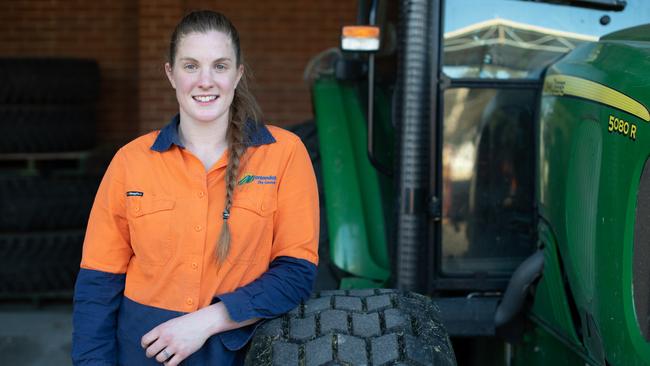National Skills Week to profile the best jobs to get in trades
Many girls choose university thinking that’s where the money is – but they may be missing out on some very lucrative careers.
Careers
Don't miss out on the headlines from Careers. Followed categories will be added to My News.
SCHOOL leavers are urged to take another look at the career possibilities available through vocational education and training, with a new video available to stream online showcasing the jobs that need workers – and the money that can be made through apprenticeships and traineeships.
Vocational skills and the varied career paths available through them will be showcased during National Skills Week, to be held from August 23 to 29.
It comes as new research reveals decisions regarding post-school training are still being made along gender lines, with girls opting for university and boys pursuing vocational education.
While some experts are disappointed by the apparent confines of tradition, Australian National University researcher Andrew Norton says that, for those who receive low ATARs, there is an “underlying economic rationale’’ to the choices being made.
“When you look at men, there are vocational occupations out there that require heavy labour and being outside but they actually pay quite well,’’ says Norton, a professor in the practice of higher education policy.

“But for women with a low-ATAR, the options at a vocational level are often early childhood or aged care – and they don’t pay nearly as well (compared to male-dominated vocational careers).
“You could earn a lot more going to university and becoming a nurse than you could becoming an aged care worker or an early childhood worker so, for women, university is the more lucrative choice.’’
A study by the National Centre for Vocational Education Research, conducted before the coronavirus pandemic hit but only recently released, found more women than men are studying at university while more men than women are in vocational education and training.
The data revealed more young men than women are in full-time work but also that men are more likely than women not to be in the labour force.
Norton says the seeming contradiction can be explained by the proportion of women unable to work full time because of family responsibilities and the higher number of men who are at the “extreme dysfunction end of education’’ who cannot access even entry-level roles.
Melbourne Institute of Applied Economics and Social Research research fellow Dr Jan Kabatek says the NCVER findings confirm the “quite stereotypical’’ career choices of many men and women.
“I would love to see different patterns that are more gender balanced but it does play into the usual narrative of how tasks are divided by men and women,’’ he says.
Kabatek says his own research, conducted post-pandemic, shows clear gender differences among those who are upskilling – with men most likely to do so to keep their current role while women upskill to find new work.
Katharine Knapman is bucking the trend of girls enrolling at university, instead undertaking an arboriculture traineeship with WPC Group.
Knapman, who is obtaining a certificate III in arboriculture while working with McLeod Trees, was recognised earlier this year at the Victorian Apprenticeship Awards, where she was named Trainee of the Year and won the International Apprentice Scholarship and Women in Trades Inspirations awards.
She hopes her achievements will highlight the contribute women can make to the vocational sector.
“It would be really cool to see some more women start trades and be part of the industry,’’ she says.
WHAT IS NATIONAL SKILLS WEEK?
National Skills Week invites Australians to explore pathways available through vocational education and training (VET) in a post-pandemic economy.
They include apprenticeships and traineeships but also certificates and diplomas that can help workers get the skills they need to be employed, or upskill in practical skills.
National Skills Week chair Brian Wexham says areas of emerging skills needs will be highlighted, career options profiled and inspiring stories told on various platforms to ensure people can participate despite lockdowns.
It ranges from virtual showcases on its own website and other social media, to in-person career expos and on-campus events at vocational training providers.
“There has never been a more pivotal time to educate jobseekers and school leavers on the importance of gaining a skill,” he says.
“There is great demand and great opportunity for many Australians to pursue career pathways through the practical and vocational sectors.
“The 2021 federal budget has a clear focus on skills training, supporting over 450,000 new training places and wage subsidies to create more than 170,000 new apprenticeships and traineeships.”

Ahead of the week, the Skills and Thrills Digital Students Showcase – a 35-minute online careers resource video – is available free via skillsone.com.au for students in year 7 to 12.
SkillsOne has interviewed VET ambassadors and industry representatives to promote pathways in industries such as healthcare, construction, hospitality and transport, and provide advice on how to connect a passion to a career.
Meanwhile, BHP has come on board as a sponsor of National Skills Week this year, joining 50 other training providers, government departments, industry organisations and businesses to support the initiative.
Its Minerals Australia president Edgar Basto says BHP is a strong supporter of training initiatives to bolster Australia’s skills base, and support the pandemic recovery.
“Providing apprenticeships, skills and training opportunities for Australians of all ages and all walks of life, particularly in our regional communities, will be critical to helping Australia bounce back,” he says.
Visit nationalskillsweek.com.au for a list of events and other ways to get involved.




